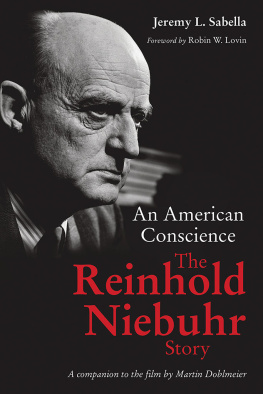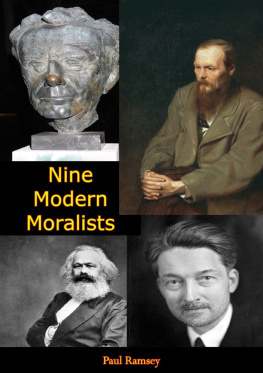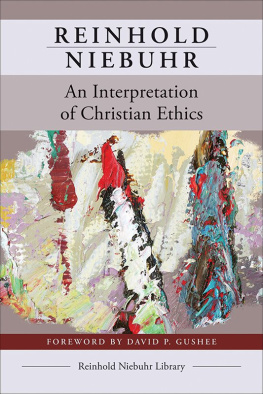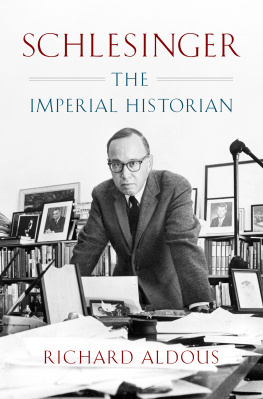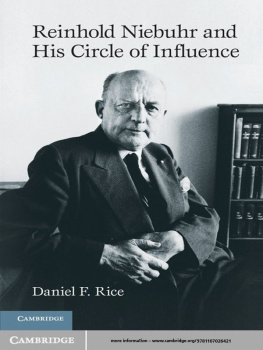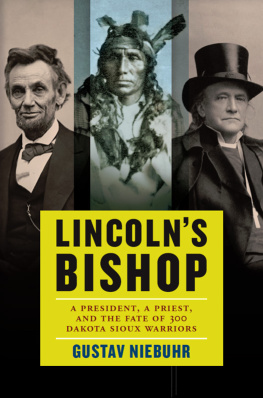An American Conscience
The Reinhold Niebuhr Story
Jeremy L. Sabella
WILLIAM B. EERDMANS PUBLISHING COMPANY
GRAND RAPIDS, MICHIGAN
Wm. B. Eerdmans Publishing Co.
2140 Oak Industrial Drive NE, Grand Rapids, Michigan 49505
www.eerdmans.com
2017 Jeremy L. Sabella
All rights reserved
Published 2017
23 22 21 20 19 18 171 2 3 4 5 6 7
ISBN 978-0-8028-7527-3
eISBN 978-1-4674-4711-9
Library of Congress Cataloging-in-Publication Data
A catalog record for this book is available from the Library of Congress
Contents
R einhold Niebuhr was an American conscience in challenging times. During much of the twentieth century, he had firsthand experience of the economic transformations and international struggles that were reshaping the nation and the world. From a defeated Germany just after the First World War, to Henry Fords Detroit and the Great Depression, through the Second World War and new understandings of global responsibility that emerged after 1945, Niebuhr was a witness to history who understood the significance of events ahead of his contemporaries. His judgments were not merely reactive. He made them with a long view of history and an understanding of human nature shaped by Christian theology. He had a place to stand that shaped his expectations and gave him something against which to measure events. That is still important today, when the secularization of our public life makes it hard to speak of pride and power in the theological terms that Niebuhr used, even though his analysis made as much sense to atheists as to Jews and Christians, and his circle of influence included politicians, religious leaders, and public figures from many different backgrounds. Claims of conscience now tend to polarize and divide us. Niebuhrs story is a reminder that conscience can also reveal what we have in common, alert us to our own limitations, and engage us in dialogue precisely on the points where we disagree.
Andrew Finstuen was among the first to see the ongoing relevance of this interaction between faith and history in the American conscience. His book Original Sin and Everyday Protestants showed how the very different theologies of Reinhold Niebuhr, Billy Graham, and Paul Tillich all probed the limits of postwar Americas complacent materialism. His work as a historian and educator convinced him that Niebuhrs time has lessons for the twenty-first century, too. The question was how to explain Niebuhrs conscience to Americans who are understandably absorbed by the problems of their day and distanced from events six or seven decades in the past. Perhaps Niebuhrs way of thinking, which helped respond to the rise of industrial America in Detroit in the 1920s, is still relevant to the challenges of globalization. Perhaps anxieties about communism and the Cold War can tell us things about ourselves that we still need to hear.
To explore those possibilities for a contemporary presentation of Niebuhrs life and work, Finstuen initiated a lively traffic in emails and phone calls with scholarly colleagues in history and theology, who quickly agreed on the relevance of Niebuhrs story and the need for a new way to make people aware of it. That is how I became involved in the project, along with Jeremy Sabella, the author of this volume.
What made this effort distinctive among the many studies of Reinhold Niebuhrs life and work was Finstuens contact with the distinguished documentary filmmaker Martin Doblmeier. His films, including Taiz, Chaplains, and The Power of Forgiveness, have often explored theological themes, and Bonhoeffer demonstrated his extraordinary ability to use visual images, personal reflections, and relevant texts to evoke the crisis of Nazism and the experiences that shaped Dietrich Bonhoeffers response to it. Doblmeier saw at once the important connection between Niebuhrs times and his theology. He told Finstuen at the end of their first telephone conversation that Niebuhr is Americas conscience, and at that point they had the theme, the title, and the director, all at once. Doblmeiers subsequent development of An American Conscience taught all of us who thought we knew something about Reinhold Niebuhr how important and transformative the events of his time were, both for American life and for Niebuhrs theology.
With Doblmeiers creative energy and archival research skills engaged, Finstuen turned to Healan Gaston, historian, scholar of both H. Richard and Reinhold Niebuhr, and president of the Niebuhr Society. She provided a comprehensive knowledge of current Niebuhr scholarship and helped make contact with theologians, historians, and political scientists who could give us perspective on the full range of Niebuhrs activities and interests, as well as a sense for the personality he brought to his work. Stanley Hauerwas, Andrew Bacevich, Gary Dorrien, and Ronald Stone all became part of the project, along with Mark Massa, SJ, Susannah Heschel, Cornel West, and many others who contributed insights into Niebuhrs thought or recollections of his teaching and speaking. Special thanks is due to Elisabeth Sifton, who brought her critical editors eye and her unique experience into our discussions of the film. Those who knew her as the editor of the Library of America volume Reinhold Niebuhr: Major Works on Religion and Politics were aware of her mastery of Niebuhrs thought. Those who knew her as Reinhold Niebuhrs daughter were not surprised by her ironic sense of humor.
As the filming got under way, Martin Doblmeiers creativity, technical skills, and attention to detail gave life to his script, which was a remarkable synthesis of the many voices he had listened to and a deft editing of just the right images, interviews, and texts into a presentation that effectively introduces Reinhold Niebuhr to those who have not heard of him and brings him to life for many others who have read and appreciated his writings. Jeremy Sabella played a vital role in these efforts. Having just completed his PhD at Boston College with a study of Reinhold Niebuhrs Christian realism during the Cold War era, he was available both as a scholarly consultant and an energetic production assistant who never flagged in his dedication to the project.
Since he had seen the interviews, talked through many of the ideas, and reviewed the archival sources, he was the logical choice to write this book to accompany the film and make it a resource for classrooms and discussion groups. His writing skills, clear thinking, and knowledge of Niebuhrs works produced something far more than a study guide. All of us who worked on the project knew that there had to be a resource that would engage people who had seen the film in a further exploration of Niebuhrs life and thought. Jeremy Sabella has done that in a book that is also a thoughtful introduction to Christian ethics, twentieth-century theology, and American religious life. This is a text that will take its own place in the literature of Niebuhr scholarship, and students, teachers, pastors, and scholars who may pick it up in relation to a viewing of the film will return to it again and again.
Both as film and book, An American Conscience: The Reinhold Niebuhr Story has a scope that reminds us of the resources needed to keep this part of our history alive in contemporary experience. Andrew Finstuen made this case to receptive audiences, beginning with Dr. Chris Coble, vice president for religion at the Lilly Endowment. Cobles encouragement was vital in the early stages of the project, and the Lilly Endowments earlier support for Doblmeiers Bonhoeffer gave us all a sense for what might be possible with

